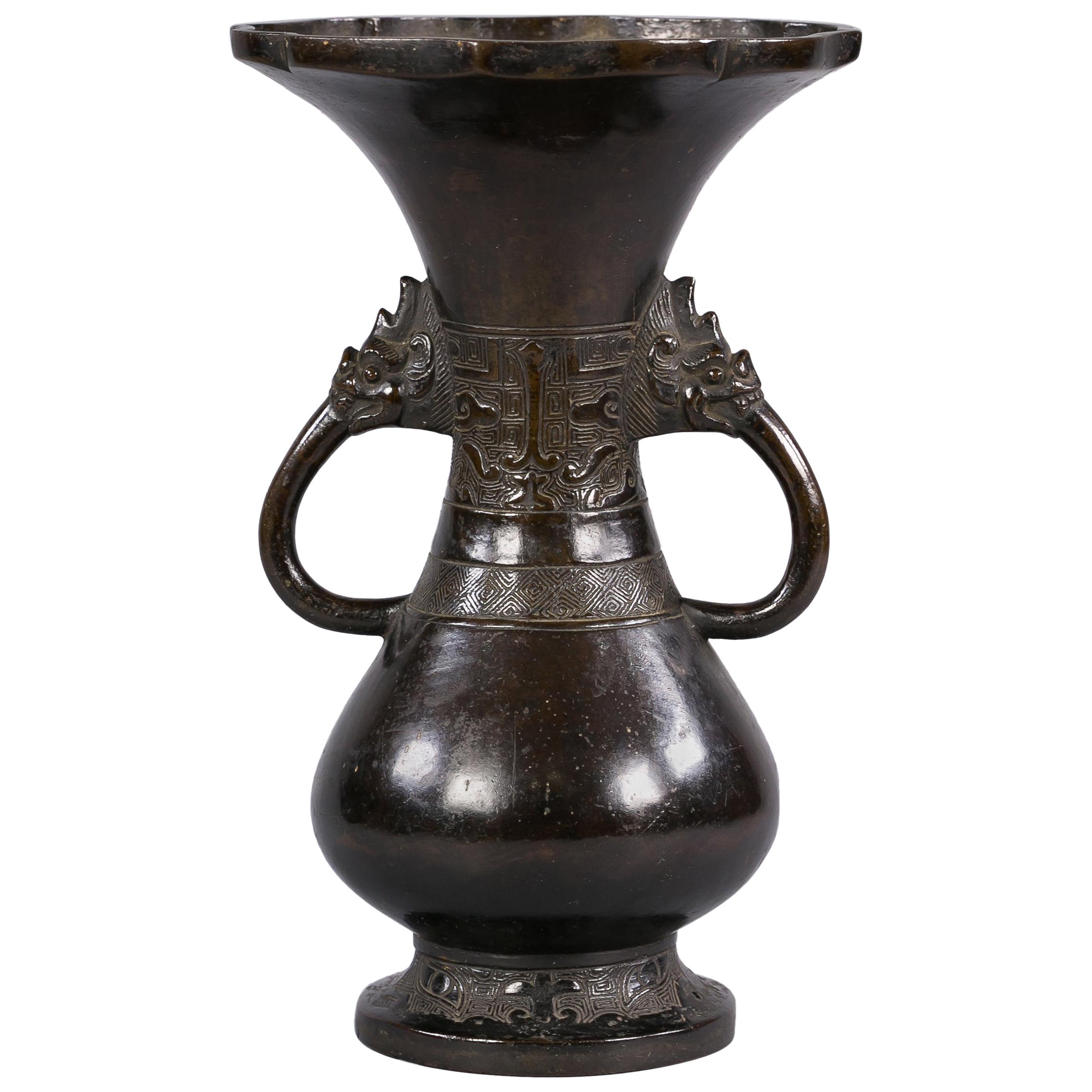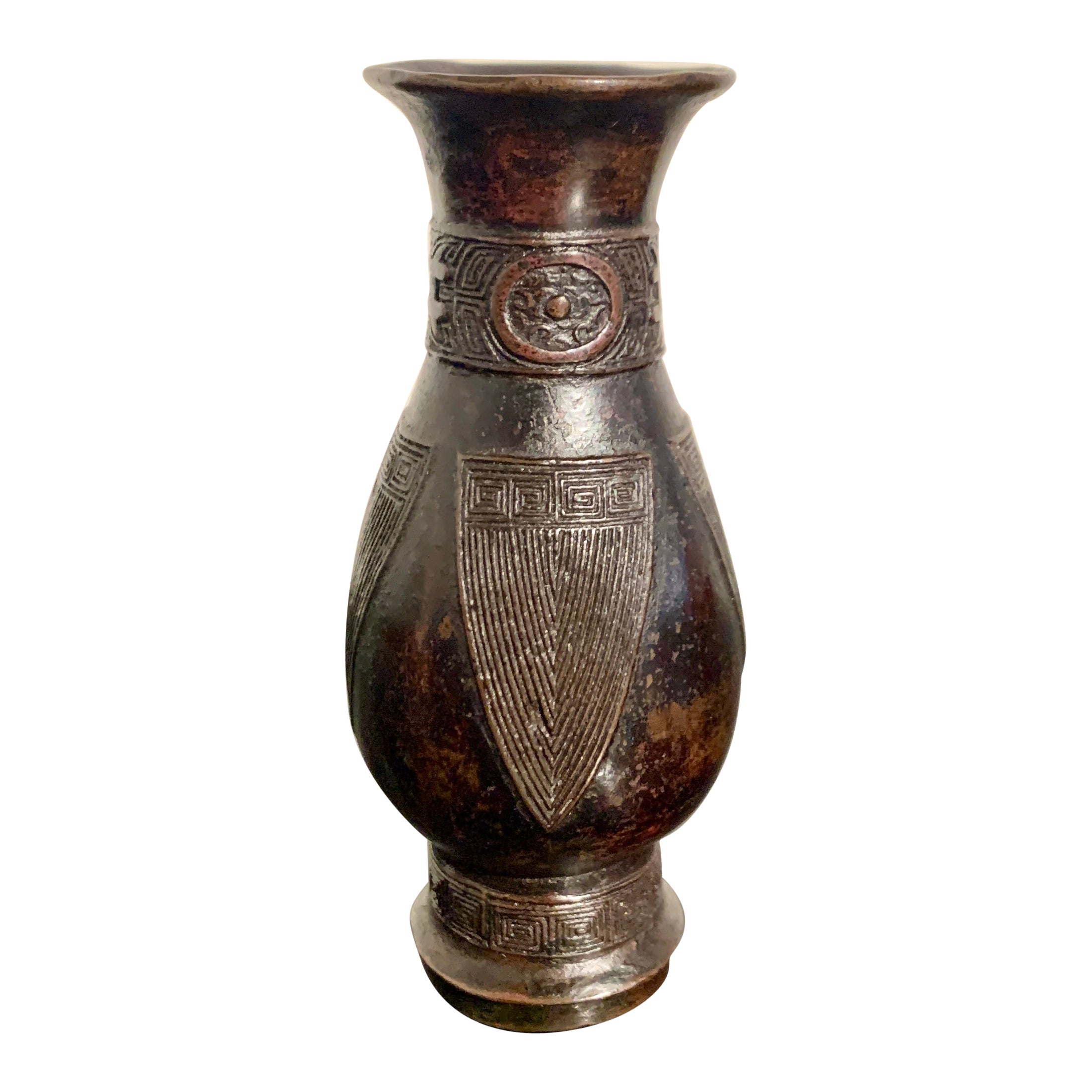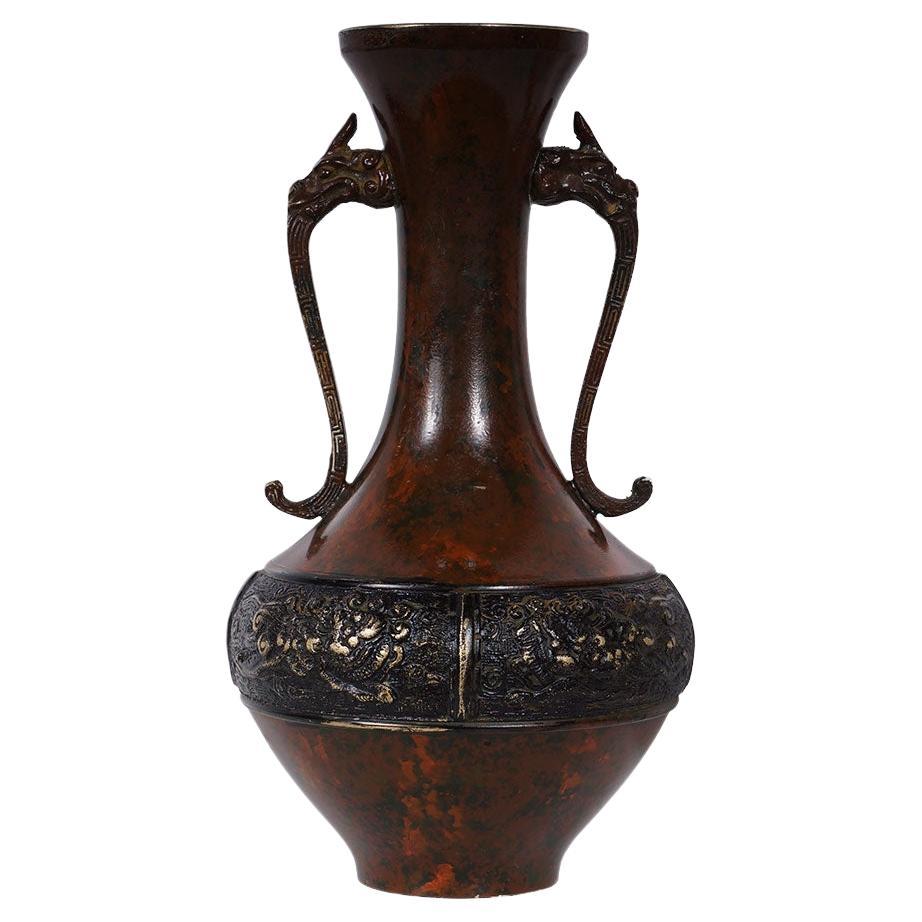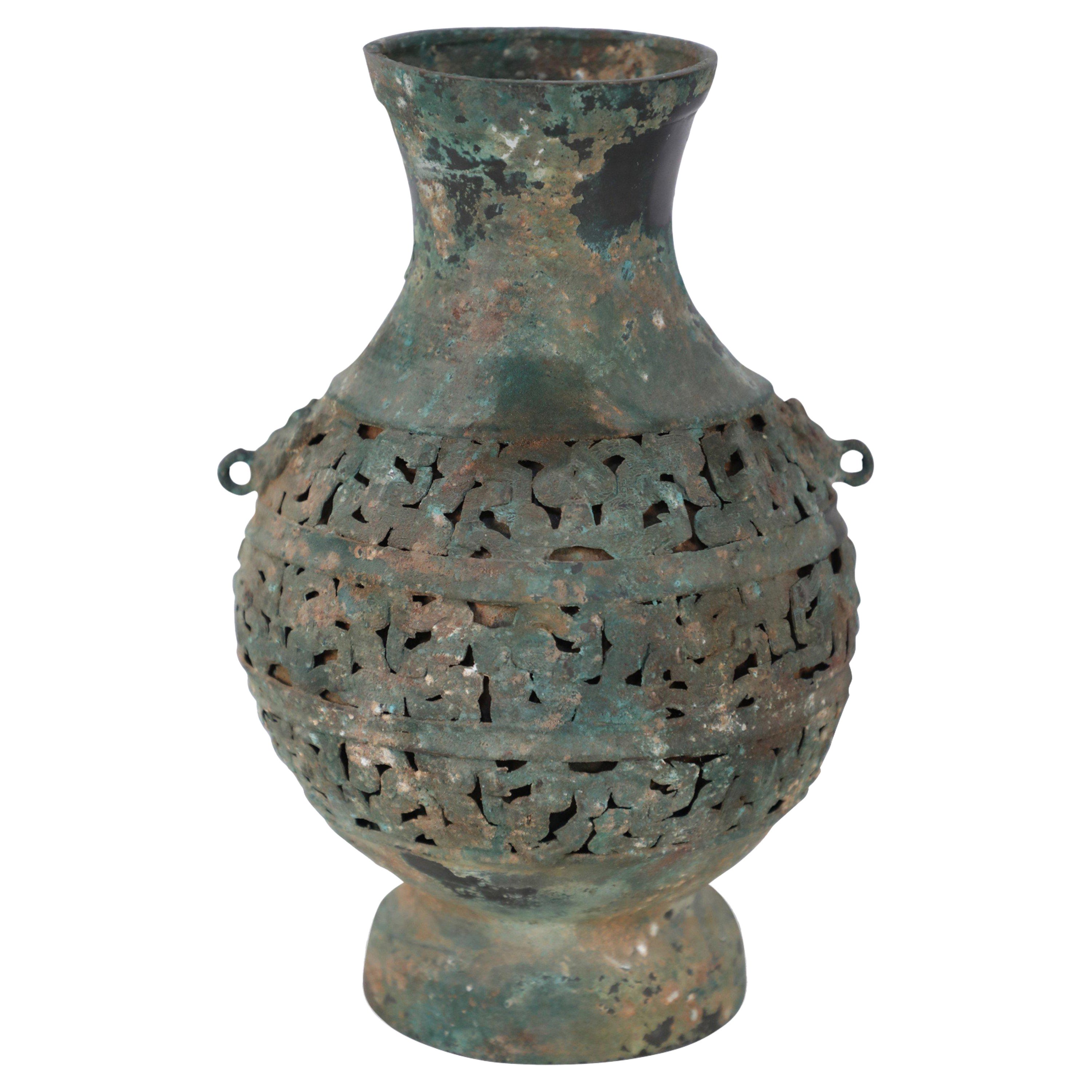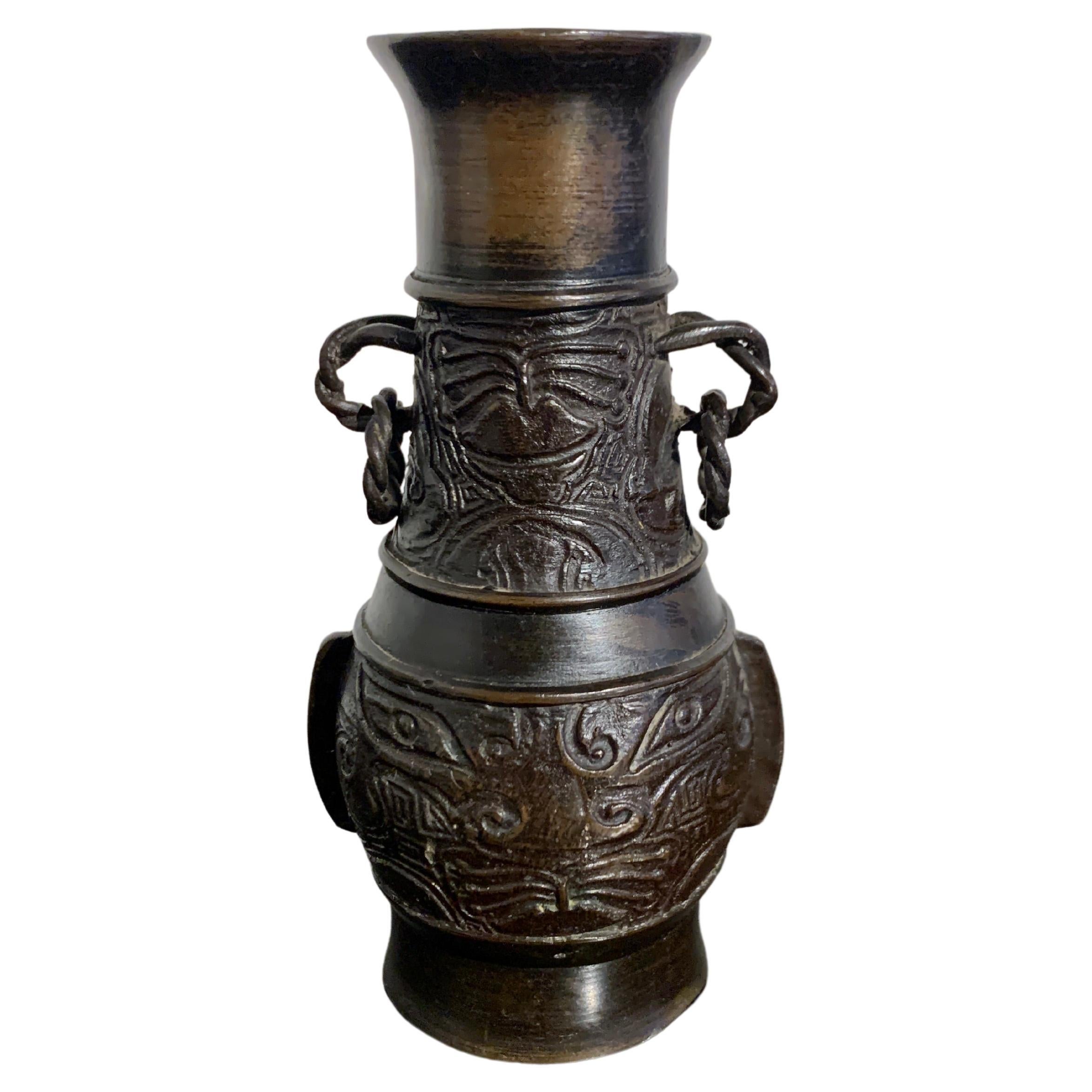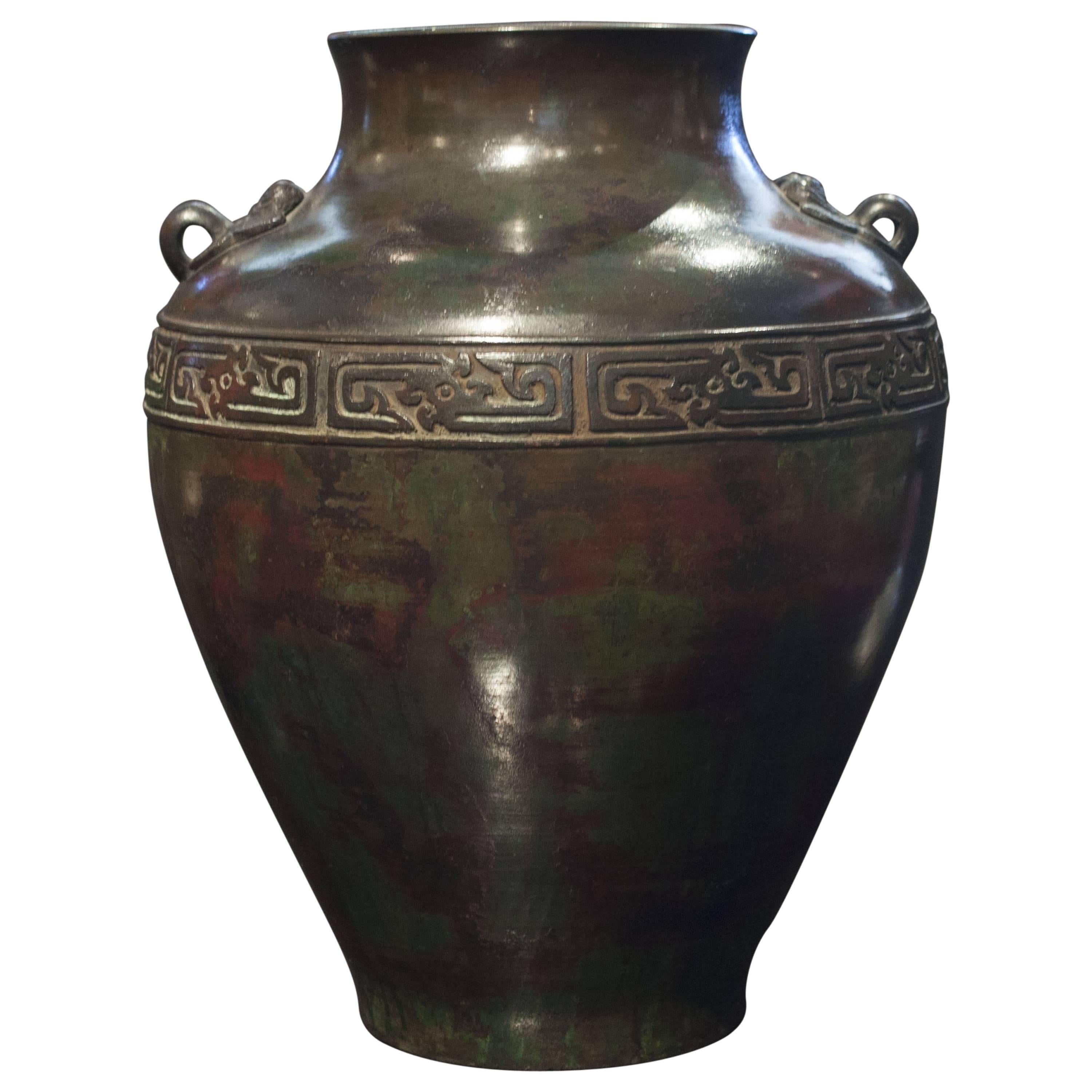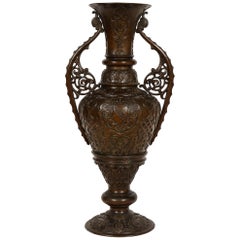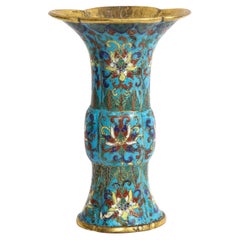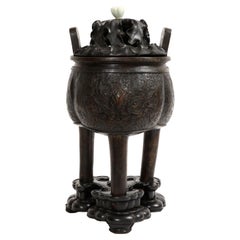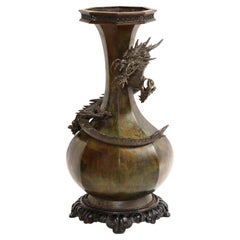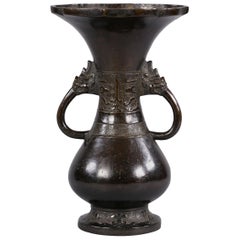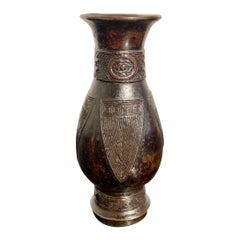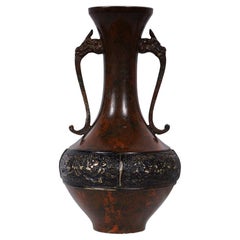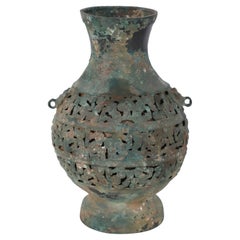Items Similar to A Ming Dynasty Patinated Bronze Relief Work Vase Turned to a Lamp
Want more images or videos?
Request additional images or videos from the seller
1 of 16
A Ming Dynasty Patinated Bronze Relief Work Vase Turned to a Lamp
$18,240
$22,80020% Off
£13,787.18
£17,233.9820% Off
€15,843.92
€19,804.9020% Off
CA$25,399.09
CA$31,748.8620% Off
A$28,255.44
A$35,319.3120% Off
CHF 14,811.86
CHF 18,514.8220% Off
MX$345,274.63
MX$431,593.2920% Off
NOK 188,610.53
NOK 235,763.1720% Off
SEK 177,550.72
SEK 221,938.4020% Off
DKK 118,268.85
DKK 147,836.0720% Off
Shipping
Retrieving quote...The 1stDibs Promise:
Authenticity Guarantee,
Money-Back Guarantee,
24-Hour Cancellation
About the Item
Hailing from the Ming period in 16/17th century, this monumental bronze vase is a fine example of the auspicious decor and markings unique to Chinese furnishings. The vase is cast with taotie masks, the basin is impressed with religious symbolism, and the handles act as two opposing dragons. The various patterned elements on this vase encompass popular Chinese bronze casting and relief carving motifs. This vase was later turned to a lamp without the need of comprimising the original piece. The bronze vase is in original condition with minimal ware.
This particular vase is an ancient Chinese Zun, a ritual wine vessel characterized by a flared opening and bulging midsection. The outside of the vase features a high and low relief decoration that is significant to Chinese symbolism. Along the neck is a relief of twirling, whipping clouds: the winds of chi’i. On the large relief on the basin, there is a relief decoration with archaic motifs like taotie masks and stylized dragons. Vases were often made to furnish the tombs of the Chinese elite. Thus, these vessels were imbued with religious symbolism and imagery to evoke otherworldly spirits for good fortune in the afterlife.
Religious symbolism is an important aspect of this vase. The winds of chi’i on the neck represent the energy of the universe, while the dragon handles symbolize great power and strength. The taotie motif on the basin holds multiple meanings—it has been interpreted as “one of the four evil creatures of the world.” It is commonly represented on Chinese ritual bronze vessels to demonstrate their mystical power and their relationship between humankind and the afterlife.
China, Circa: Ming Dynasty
The Height of the Piece With the Electrical Fitting is: 32 inches and 23 inches Without the Electrical Fitting
- Dimensions:Height: 23 in (58.42 cm)Width: 12 in (30.48 cm)Depth: 9 in (22.86 cm)
- Style:Ming (Of the Period)
- Materials and Techniques:Bronze,Patinated
- Place of Origin:
- Period:
- Date of Manufacture:Ming Dynasty
- Condition:Wear consistent with age and use.
- Seller Location:New York, NY
- Reference Number:1stDibs: LU919538603142
About the Seller
4.9
Platinum Seller
Premium sellers with a 4.7+ rating and 24-hour response times
Established in 1820
1stDibs seller since 2011
194 sales on 1stDibs
Typical response time: <1 hour
- ShippingRetrieving quote...Shipping from: New York, NY
- Return Policy
Authenticity Guarantee
In the unlikely event there’s an issue with an item’s authenticity, contact us within 1 year for a full refund. DetailsMoney-Back Guarantee
If your item is not as described, is damaged in transit, or does not arrive, contact us within 7 days for a full refund. Details24-Hour Cancellation
You have a 24-hour grace period in which to reconsider your purchase, with no questions asked.Vetted Professional Sellers
Our world-class sellers must adhere to strict standards for service and quality, maintaining the integrity of our listings.Price-Match Guarantee
If you find that a seller listed the same item for a lower price elsewhere, we’ll match it.Trusted Global Delivery
Our best-in-class carrier network provides specialized shipping options worldwide, including custom delivery.More From This Seller
View AllLarge Patinated Bronze Alhambra Islamic Vase Made for the Islamic Market
Located in New York, NY
Large French patinated bronze Alhambra Islamic vase made for the Islamic market, beautifully hand chiselled and detailed with openwork Bronze handles, the central medallion with Isla...
Category
Antique 1870s French Islamic Vases
Materials
Bronze
Antique Chinese Cloisonné Enamel Gu Form Vase, 17th/18th Century, Kangxi Period
Located in New York, NY
A Fantastic, rare, and antique Chinese Cloisonné Enamel Gu Form vase, 17th/18th century, Kangxi Period. This cloisonne vase is extremely rare to find in this quality, condition, age,...
Category
Antique Late 17th Century Chinese Qing Metalwork
Materials
Bronze
17th Century Chinese Bronze Censer & Cover with Jade Finial Top and Wood Base
Located in New York, NY
A Fantastic and Rare 17th century Chinese Patinated Bronze Censer & Cover with Jade Finial Top and Wood Base. The body of this censor is intricately decorated with Archaistic decoration in hand-chassed relief. The wooden lid is designed with a foliate, leaf-like form, with a gorgeous white jade finial in the shape of a lotus leaf. The gorgeous tripod censer stands...
Category
Antique 1690s Chinese Qing Metalwork
Materials
Bronze
$14,800 Sale Price
20% Off
Very Large Fantastic Japanese Meji Period Patinated Bronze Dragon Vase
Located in New York, NY
A Fantastic Japanese Meji Period Patinated Bronze Dragon Vase. This vase is both elegant and awe-inspiring specifically for its Size and shape. The very...
Category
Antique 19th Century Japanese Meiji Vases
Materials
Bronze
A Japanese Meiji Period Patinated Bronze Centerpiece/Bowl w/ Dragon in Relief
Located in New York, NY
A Fantastic and large Japanese Meiji Period Patinated Bronze Centerpiece/Bowl/jar denier with Dragon in Relief. This captivating and exquisite, hand-crafted, patinated bronze centerpiece serves as a remarkable focal point, adorned with marvelously hand-chassed and hand-chiseled dragons in relief, gracefully emerging and disappearing behind artfully stylized scrolling etched clouds. The centerpiece boasts a substantial and graceful curved base, complemented by a striking peaked and square-edged lip atop the vessel.
The significance behind the depiction of the three-clawed dragons stems from the Japanese belief that Eastern dragons originated within their native land. According to their folklore, as these majestic creatures ventured away from Japan, they acquired additional toes. The Japanese Sky dragon...
Category
Antique 1890s Japanese Meiji Metalwork
Materials
Bronze
An Unusual Chinese Famille Vert Porcelain Vase with Bamboo Handles
Located in New York, NY
An Unusual Chinese Famille Vert Porcelain Vase with Bamboo Handles The white stylized cloud-like section on the main body of the vase features a stunni...
Category
Antique Early 1900s Qing Vases
Materials
Porcelain
You May Also Like
Chinese Bronze Archaic Style Vase, 18th century
Located in New York, NY
Chinese bronze archaic style vase, 18th century.
Category
Antique 18th Century Vases
Materials
Bronze
Chinese Archaisitc Bronze Small Scholar Vase, 17th Century, China
Located in Austin, TX
A fine small archaistic scholar's vase in the form of a zun, Ming to Qing Dynasty, 17th century, circa 1650, China.
The small vessel of elegant proportions and wonderfully cast. T...
Category
Antique Mid-17th Century Chinese Qing Scholar's Objects
Materials
Bronze
19th Century Antique Chinese Carved Bronze Vase
Located in Pomona, CA
Very nice antique Chinese bronze vase decorated with a carved low relief idealized frieze with Chinese traditional forks art of Kin Lin sym...
Category
Antique 19th Century Chinese Chinese Export Vases
Materials
Bronze
Antique Chinese Han Dynasty-Style Patinated Bronze Pierced Urn
Located in Queens, NY
Antique Chinese Han Dynasty-style copy of a bronze urn bearing a green and black patina, decorated with pierced sides forming patterns that wrap the form, and accented with one small...
Category
20th Century Chinese Ming Urns
Materials
Metal
Chinese Bronze Scholar Vase with Taotie, Ming/Qing Dynasty, 17th century, China
Located in Austin, TX
A small and interesting cast bronze archaistic scholar vase with loose ring handles and taotie mask design, late Ming or early Qing Dynasty, mid 17th century, China.
The small vase of archaistic hu form, and cast with archaistic designs. Sitting on a tall splayed ring foot, the round body is cast with a large band featuring a ferocious taotie (ogre) mask. The taotie mask in this case id decidedly feline, with a ruyi shaped snout above a whiskered mouth. Two flanges stick out to either side of the mask, reminiscent of ears.
A wide, tall neck rises from the body, terminating in a slightly everted mouth. The archaistic cast design on the neck is not as clear, but most likely represents Fusang, a mythical island in the Eastern Sea where the legendary Fusang tree grows. The Fusang tree, home to the mythical Sun Bird...
Category
Antique Mid-17th Century Chinese Qing Scholar's Objects
Materials
Bronze
Chinese Archaic Patinated Bronze Vase, Early 20th Century
Located in Austin, TX
An elegant and beautifully cast early 20th century Chinese bronze vase in the archaic style with a gorgeous lacquer simulated patina in shades of brown, red and green.
The shoulders...
Category
Early 20th Century Chinese Archaistic Metalwork
Materials
Bronze
